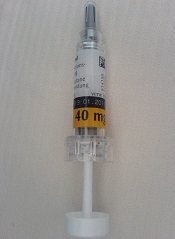
Cancer patients with brain metastases who develop venous thromboembolism can safely receive the anticoagulant enoxaparin without further
increasing their risk of intracranial hemorrhage, according to a study published in Blood.
Cancer patients with brain metastases are known to have an increased risk of intracranial hemorrhage, but it has not been clear whether receiving anticoagulant therapy further increases that risk.
So a group of researchers set out to assess the risk of intracranial hemorrhage in cancer patients with brain metastases who received the low-molecular-weight-heparin (LMWH) enoxaparin.
Jeffrey Zwicker, MD, of Harvard Medical School in Boston, Massachusetts, and his colleagues studied the medical records of 293 cancer patients with brain metastasis, 104 of whom had received the LMWH enoxaparin and 189 who did not.
The researchers matched the patients in each group by the year of brain metastases diagnosis, tumor type, age, and gender. The team conducted a blinded review of radiographic imaging and categorized intracranial hemorrhages as “trace,” “measurable,” and “significant.”
At 1 year of follow-up, there was no significant difference between the treatment groups regarding the incidence of intracranial hemorrhage.
Nineteen percent of patients in the enoxaparin arm had measurable intracranial hemorrhages, compared to 21% of patients in the control arm (P=0.97). And 21% of patients in the enoxaparin arm had significant intracranial hemorrhages, compared to 22% of patients in the control arm (P=0.87).
The cumulative incidence of intracranial hemorrhage was 44% in the enoxaparin arm and 37% in the control arm (P=0.13).
In addition, there was no significant difference in overall survival between the treatment arms. The median overall survival was 8.4 months in the enoxaparin arm and 9.7 months in the control arm (P=0.65).
“While it is a very common clinical scenario to treat a patient with a metastatic brain tumor who also develops a blood clot, before this study, there was very little data to inform the difficult decision of whether or not to anticoagulate these patients,” Dr Zwicker said.
“Our findings, which demonstrate that current practice is safe, should reassure physicians that anticoagulants can be safely administered to patients with brain metastases and a history of blood clots.”


